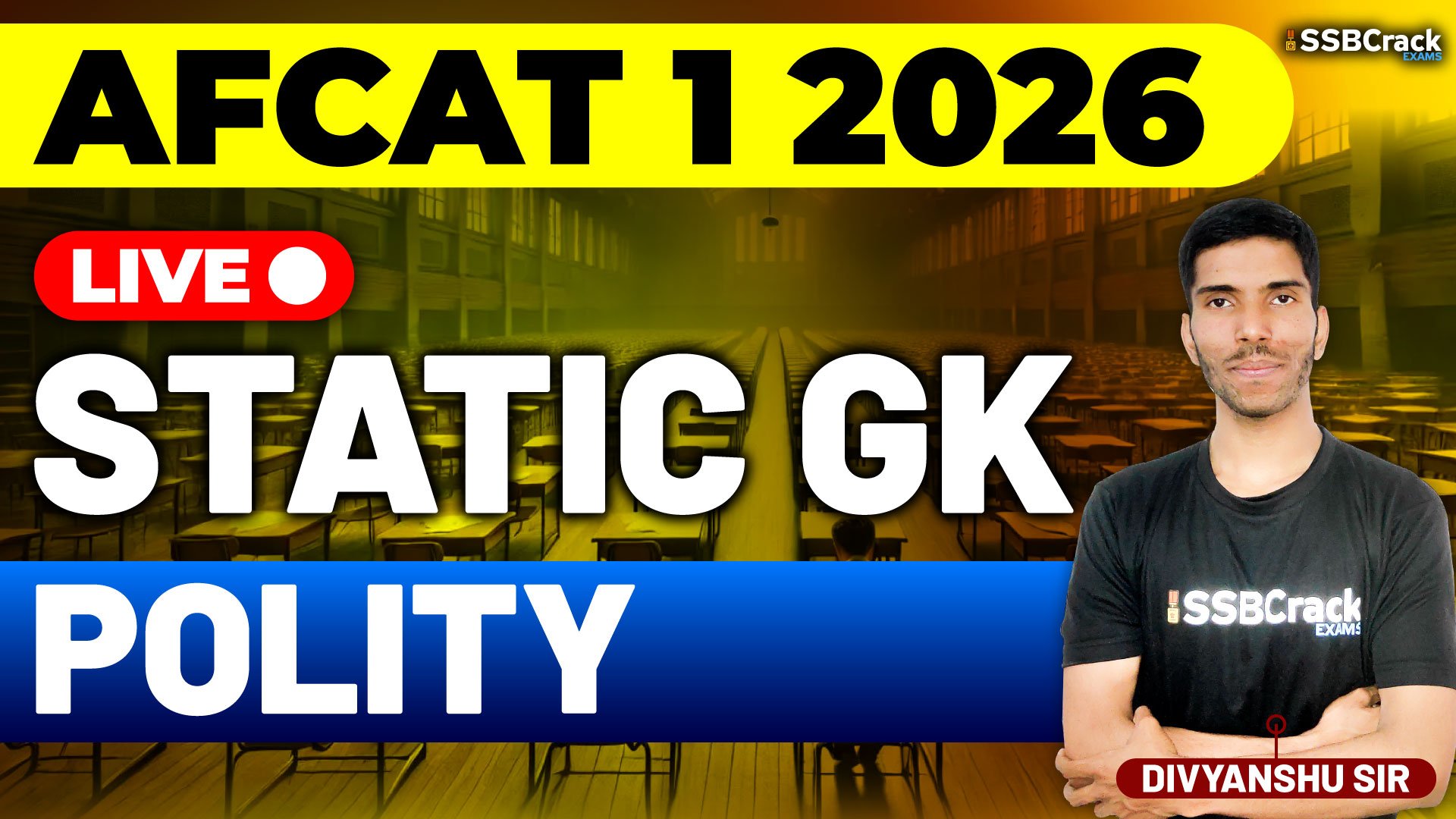Indian Polity forms a vital component of the Static General Knowledge section in the AFCAT 1 2026 Exam. Questions from this topic assess a candidate’s understanding of the Constitution of India, fundamental rights, governance system, and key political institutions. A strong foundation in Polity not only helps in AFCAT but also in other Defence exams like CDS and NDA.
AFCAT 1 2026 Exam Static GK- Polity
1. Introduction to Indian Polity
Indian Polity deals with the structure, organization, and functioning of the government of India. It encompasses the Constitution, Parliament, Judiciary, Executive, Local Governance, and Constitutional Amendments. The subject reflects the democratic principles and political framework that guide the nation.
2. The Constitution of India
- Adopted on: 26 November 1949
- Came into force on: 26 January 1950
- Drafted by: Constituent Assembly under Dr. B.R. Ambedkar (Chairman of the Drafting Committee)
- Nature: The Constitution is written, lengthiest, federal with unitary bias, and rigid as well as flexible.
- Original copies: Written in English and Hindi, and kept in the Parliament Library.
Key Features of the Indian Constitution:
- Parliamentary form of Government
- Federal system with unitary features
- Fundamental Rights and Duties
- Directive Principles of State Policy (DPSPs)
- Independent Judiciary
- Single Citizenship
- Universal Adult Franchise
3. Preamble of the Constitution
The Preamble serves as the philosophical foundation of the Constitution. It declares India to be:
- Sovereign – Free from external control
- Socialist – Equal distribution of wealth
- Secular – Equal respect for all religions
- Democratic – Government of the people, by the people, for the people
- Republic – Head of State is elected
Objective: To secure justice, liberty, equality, and fraternity for all citizens.
4. Fundamental Rights (Part III)
These are the basic human rights guaranteed to all citizens:
- Right to Equality (Articles 14–18)
- Right to Freedom (Articles 19–22)
- Right against Exploitation (Articles 23–24)
- Right to Freedom of Religion (Articles 25–28)
- Cultural and Educational Rights (Articles 29–30)
- Right to Constitutional Remedies (Article 32) – known as the “heart and soul of the Constitution” (Dr. B.R. Ambedkar)
5. Directive Principles of State Policy (Part IV)
- Aim to create a welfare state.
- Derived from the Irish Constitution.
- Not enforceable by law but fundamental in governance.
Examples: - Equal pay for equal work (Article 39)
- Promotion of education and public health (Article 47)
6. Fundamental Duties (Part IVA – Article 51A)
- Added by the 42nd Constitutional Amendment, 1976.
- Inspired by the USSR Constitution.
- There are 11 Fundamental Duties, emphasizing national unity, respect for the Constitution, and environmental protection.
7. The Union Executive
- President:
- Head of the State
- Elected for 5 years by an Electoral College
- Acts on the advice of the Council of Ministers headed by the Prime Minister
- Vice-President:
- Ex-officio Chairman of the Rajya Sabha
- Prime Minister and Council of Ministers:
- Real executive authority
- Responsible to the Lok Sabha
8. The Parliament of India
- Bicameral Legislature consisting of:
- Lok Sabha (House of the People) – Lower House
- Rajya Sabha (Council of States) – Upper House
Important Points:
- The President is part of the Parliament.
- Lok Sabha term: 5 years.
- Speaker presides over Lok Sabha.
- Rajya Sabha is a permanent body with one-third members retiring every two years.
9. The Judiciary
- Supreme Court of India – Apex court, established in 1950.
- Headed by the Chief Justice of India (CJI).
- Ensures judicial review, independence of judiciary, and protection of fundamental rights.
- Below it are High Courts and District Courts.
10. Important Constitutional Amendments
| Amendment | Year | Key Provision |
|---|---|---|
| 42nd Amendment | 1976 | Added Fundamental Duties, made India Socialist & Secular |
| 44th Amendment | 1978 | Restored powers of Judiciary and Fundamental Rights |
| 73rd Amendment | 1992 | Introduced Panchayati Raj System |
| 74th Amendment | 1992 | Strengthened Urban Local Bodies |
| 86th Amendment | 2002 | Made Right to Education a Fundamental Right (Article 21A) |
11. Local Governance
- Panchayati Raj (Rural): 3-tier system – Gram Panchayat, Panchayat Samiti, Zila Parishad
- Urban Local Bodies: Municipalities and Municipal Corporations
- Aim: Decentralization of power and grassroot democracy
12. Important Articles and Schedules
| Article | Subject |
|---|---|
| Article 14 | Equality before Law |
| Article 19 | Freedom of Speech & Expression |
| Article 21 | Right to Life & Personal Liberty |
| Article 32 | Right to Constitutional Remedies |
| Article 370 | Special Status to J&K (now repealed) |
| Schedule | Description |
|---|---|
| 1st | Names of States and Union Territories |
| 7th | Division of Powers (Union, State, Concurrent Lists) |
| 8th | Official Languages (22 languages) |
| 9th | Laws protected from judicial review |
| 10th | Anti-defection Law |
13. Important Constitutional Positions
| Position | First Holder |
|---|---|
| President | Dr. Rajendra Prasad |
| Vice-President | Dr. S. Radhakrishnan |
| Prime Minister | Pt. Jawaharlal Nehru |
| Chief Justice of India | H.J. Kania |
| Speaker of Lok Sabha | G.V. Mavalankar |
Conclusion
Understanding Indian Polity is crucial for AFCAT aspirants, as it provides insight into how the nation functions and upholds democratic values. Candidates should focus on important Articles, Amendments, and Constitutional bodies, along with current developments in governance. A good grasp of these fundamentals ensures a strong score in the Static GK portion of the AFCAT 1 2026 Exam.







